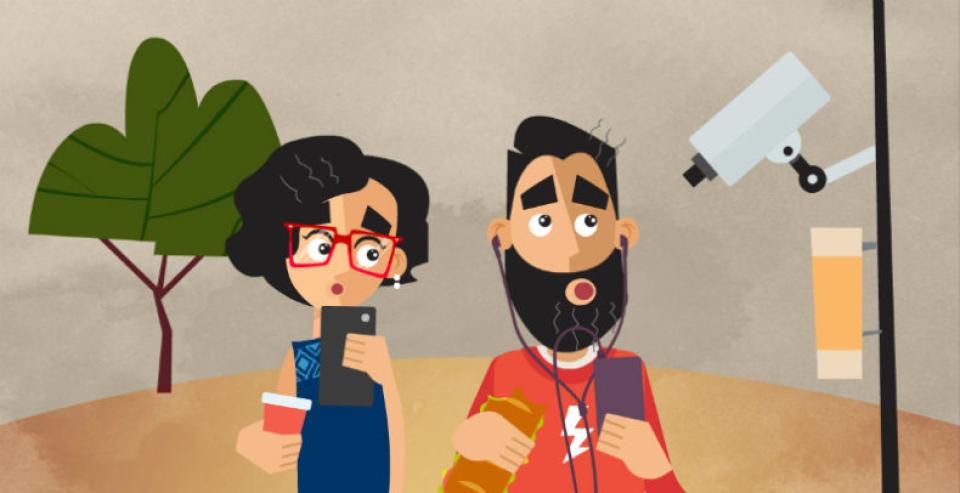
Image from 7amleh campaign on raising awareness around digital security
Palestinian society is currently witnessing one of the fastest growing rates of gender based violence online in the world, which comes in light of rapid evolving of the use of internet and social media by Palestinians. Over 3,000,000 Palestinian internet users were registered in the West Bank and Gaza in 2017 1 as social media platforms become an arena of political and social confrontation against the Israeli occupation and building historical narratives as well as discussing internal issues within Palestinian society.
Over 3,000,000 Palestinian internet users were registered in the West Bank and Gaza in 2017 as social media platforms become an arena of political and social confrontation against the Israeli occupation and building historical narratives as well as discussing internal issues within Palestinian society.
Recent figures reveal that although the gender gap in internet usage has reduced substantially in Palestinian communities, girls and women are still disproportionately affected by the local as well as the global sociopolitical structures of gender relations. Palestinian girls and women’s rights are constantly challenged by social pressures and norms in addition to being subject to a decades-long occupation, which further limits the extent to which they can positively contribute to community and civic activism.
An inclusive, safe and gender friendly internet is a fundamental prerequisite for building a free and open internet and as social media platforms become new grounds for contestation, it is necessary that women are able to contribute to the debate through enhanced civic and democratic participation. However, women are continuously subjected to a wide array of crimes such as hacking, blackmailing, hate speech and sextortion. This is particularly pronounced in Palestine, where cyber-crimes against women have been dramatically rising in recent years. In 2015, around 1,020 cybercrimes were registered in Hebron in the occupied territories, in comparison to 922 in 20142 and 850 cases were investigated in the first quarter of 2017, according to Palestinian police.3
Assiwar – The Feminist Arab Movement reported a dramatic rise in online sexual assault against women in Palestine. In 2016, 13% of assaults against women were in the form of threats and blackmailing to publish photos, 21% of which took place on the internet. This increased to 35% of sexual assaults taking place online in 2017, constituting a 14% rise in just one year.4
In 2016, 13% of assaults against women were in the form of threats and blackmailing to publish photos, 21% of which took place on the internet. This increased to 35% of sexual assaults taking place online in 2017, constituting a 14% rise in just one year.
One of the many cases in Palestine is the story of a 25-year-old woman from the West Bank city of Hebron whose Facebook was hacked by a Palestinian man. He stole her private photos and threatened her to publish them unless she paid him. He extorted 10,000 Israeli shekels and 250 grams of gold from her until she ran out of money and eventually resorted to reporting him to the police.5
The Palestinian police also reported a case in which a young woman gave a young man who said he would marry her - 90,000 NIS (25,500$) for his university tuition. Through their relationship, he was able to obtain photographs of her which he used to further extort $64,000 from her.6
The lack of awareness and reporting makes it very difficult to know the exact figures of GBV online in Palestine, aside from the information from the Palestinian police. Also many women are compelled to self-censor online due to fear of intimidation, harassment or threats. A recent poll conducted by 7amleh – The Arab Centre for Social Media Advancement indicates that only 39.8% of Palestinian females feel safe in sharing personal information and photos across social media, in contrast to 56.2% of men. The poll also revealed that 42.9% of women practice self-censorship online.7

Image from 7amleh campaign for freedom of expression for Palestinian youth - We will not be silent
Additionally, there are no legal frameworks in the West Bank or Gaza to protect women from crimes on the net, which is exacerbated by the increasing authoritarian trends demonstrated by the Palestinian Authority and Hamas who are paving the way for cyber-crimes through censorship, imprisonment and restricted internet access. In July 2017, the Palestinian Authority adopted the Electronic Crimes Law through a presidential decree. Although the law has been passed under the pretext of fighting crimes on the net, such as sextortion, hacking, blackmail, impersonation etc. the law has been drafted in such a manner that it curbs freedom of expression, silences political opponents and limits online access. Just weeks following the formal introduction, five journalists were arrested for writing Facebook posts critical of the PA, whilst there have been no arrests on claims of fraud or sextortion.
Additionally, there are no legal frameworks in the West Bank or Gaza to protect women from crimes on the net, which is exacerbated by the increasing authoritarian trends demonstrated by the Palestinian Authority and Hamas who are paving the way for cyber-crimes through censorship, imprisonment and restricted internet access.
Efforts by Palestinian civil society to combat GBV online
7amleh – the Arab Center for the Advancement of Social Media has recently expanded its digital security program to include online GBV and is one of the few Palestinian organisations addressing the issue. In order to coordinate advocacy efforts between civil society actors, 7amleh held a roundtable discussion in March 2018 to debate the phenomena of online harassment and extortion8. This event provided the opportunity for digital security experts, activists and members of feminist organisations to recount their experience in dealing with victims of online GBV. During the discussion, Naela Awad, the director of the Women Against Violence Association stated that more than 17% of calls for assistance they receive are related to harassment and sexual violence online. She also mentioned that the Israeli police close approximately 80% of those files, whereas only 20% are actually dealt with.
Similarly, in Gaza, the police cyber unit has been receiving cases of sextortion on a monthly basis, mainly reported by the relatives of female victims. The most common case is when women sell their mobile phones assuming that they have deleted their private information and photos only to find out later that they are being blackmailed into extortion. In response, the all-female police unit in Gaza designed and launched a campaign titled Sahwa (awakening in English) in conjunction with the Culture and Free Thought Association to raise awareness about the cybercrime of sextortion through workshops and outreach activities.9
Project management stated that women in Gaza are keen to engage with the issue of online GBV with almost 9,000 women attending their activities. The unit has even gone so far as to arrest a 30-year-old man in Gaza who had lured women on Facebook into romantic relationships before extorting from them.10
Conclusion
The safety for Palestinian women and girls on the net is all the more crucial in the Palestinian context where the internet must serve as a venue for Palestinian women and girls to challenge societal norms and engage in critical debate to voice their opposition to on-going Israeli policy of occupation, displacement and colonialism. Nevertheless, online participation by Palestinian women and girls is hindered at the local, regional and global level through conservative societal norms, increased online violence, local laws that are enacted by Palestinian governments to suppress free speech, a high-tech surveillance apparatus and predictive policy system developed by the Israeli government and social media giants’ biased content moderation. The disparity between the rise of GBV crimes on the internet compared to public awareness and legislation concerning this issue is of huge concern. And for that reason Palestinian civil society must build their capacities in order to address online GBV through awareness raising, initiatives, workshops and support lines.
Online participation by Palestinian women and girls is hindered at the local, regional and global level through conservative societal norms, increased online violence, local laws that are enacted by Palestinian governments to suppress free speech, a high-tech surveillance apparatus and predictive policy system developed by the Israeli government and social media giants’ biased content moderation.
Footnotes
1. 7amleh – The Arab Centre for Social Media Advancement, “#Palestine 2017”, April 2018. http://7amleh.org/2018/04/03/press-release-palestine-2017-report-palesti...
Return to main text
2. Al-Monitor, "Palestinian women increasingly targeted online”, January 2016, available at: ttp://www.al-monitor.
com/pulse/originals/2016/01/palestine-cybercrimes-highrates-taboo-law.html#ixzz4zmQWZK52
3. Ramallah Mix, “The story of a Palestinian woman who paid 90,000 Shequel and 64,000 dollars to prevent her picture from being posted online”, August 2017, available at: http://www.rmix.ps/archives/106916
4. Assiwar, Activities Report, 2015. https://assiwar.org/2016/04/04/assiwars-activities-report-2015/
Return to main text
5. Ramallah Mix, “The story of a Palestinian woman who paid 90,000 Shequel and 64,000 dollars to prevent her picture from being posted online”, August 2017, available at: http://www.rmix.ps/archives/106916
Return to main text
6.Ramallah Mix, “The story of a Palestinian woman who paid 90,000 Shequel and 64,000 dollars to prevent her picture from being posted online”, August 2017, available at: http://www.rmix.ps/archives/106916
Return to main text
7.7amleh – the Arab Center for Social Media Advancement, “Digital Security Poll”, January 2016, available at:
http://7amleh.org/2017/01/29/7amleh-publishes-the-results-of-the-digital...
the-first-time/
Return to main text
8. http://7amleh.org/2018/03/11/7amleh-organises-roundtable-discussion-on-o...
Return to main text
9.Ministry of Interior, “Women Police Launch Sahwa Campaign to Raise Awareness on Electronic Sexual Blackmail,” June 2017, available at: https://moi.gov.ps/Home/Post/119082
Return to main text
10.See the campaign’s Facebook public group here: https://www.facebook.com/groups/784619191707566/
permalink/844521789050639/
Return to main text
- 11573 views






Add new comment